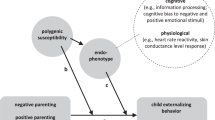Abstract
Purpose
Consistent and non-specific associations have been found between parenting style and major depression, anxiety disorders, and externalizing behavior. Although often considered part of twins’ shared environment, parenting can also be conceptualized as non-shared environment. Non-shared environmental influences have important effects on development but are difficult to test and sort out because of the possible confounding effects of gene-environment interactions and evocative gene-environment correlations. The monozygotic (MZ) differences approach is one way to analytically investigate non-shared environment.
Methods
The aim of the present study is to use the MZ differences approach to investigate the relationship between differential parenting among 1303 twin pairs (mean age 36.69 ± 8.56) and differences in total symptom counts of major depression (MD), generalized anxiety disorder (GAD), conduct disorder (CD), and anti-social behavior (ASB) during adulthood.
Results
Although effect sizes tended to be small, a number of results were significantly different from zero. Perceived differences in parental coldness was positively associated with internalizing disorders. Differences in protectiveness were negatively associated with MD, GAD, and ASB. Differences in authoritarianism were positively associated with MD and CD, but negatively associated with ASB.
Conclusions
Perceived differences in parenting style are associated with differences in MD, GAD, CD, and ASB outcomes in a sample of MZ twins. Despite the lack of a basis for making causal inferences about parenting style and psychopathology, these results are suggestive of such a relationship and show that non-shared environmental influence of parenting does in some cases significantly predict adult psychopathology.

Similar content being viewed by others
References
Kendler KS, Kessler RC, Neale MC, Heath AC, Eaves LJ (1993) The prediction of major depression in women: toward an integrated etiologic model. Am J Psychiatry 150:1139–1148
Kendler KS, Myers J, Prescott CA (2000) Parenting and adult mood, anxiety, and substance use disorders in female twins: an epidemiological, multi-informant, retrospective study. Psychol Med 30:281–294
Parker G (1979) Parental characteristics in relation to depressive disorders. Br J Psychiatry 134:138–147
Parker G (1983) Parental ‘affectionless control’ as an antecedent to adult depression. A risk factor delineated. Arch Gen Psychiatry 40:956–960
DiBartolo PM, Helt M (2007) Theoretical models of affectionate versus affectionless control in anxious families: a critical examination based on observations of parent-child interactions. Clin Child Fam Psychol Rev 10:253–274
McLeod BD, Wood JJ, Weisz JR (2007) Examining the association between parenting and childhood anxiety: a meta-anaylsis. Clin Psychol Rev 10:253–274
Wood JJ, McLeod BD, Sigman M, Hwang WC, Chu BC (2003) Parenting and childhood anxiety: theory, empirical findings, and future directions. J Child Psychol Psychiatr 44:134–151
Rothbaum F, Weisz JR (1994) Parental caregiving and child externalizing behavior in nonclinical samples: a meta-analysis. Psychol Bull 116:55–74
Enns MW, Cox BJ, Clara I (2002) Parental bonding and adult psychopathology: results from the U.S. National Comorbidity Survey. Psychol Med 32:997–1008
Otowa T, Gardner CO, Kendler KS, Hettema JM (2013) Parenting and risk for mood, anxiety and substance use disorders: a study in population-based male twins. Soc Psychiatry Psychiatr Epidemiol 48:1841–1849
Plomin R, Daniels D (2011) Why are children in the same family so different from one another? Int J Epidemiol 40:563–582
Rowe DC (1981) Environmental and genetic influence on dimensions of perceived parenting: a twin study. Dev Psychol 17:203–208
Plomin R, DeFries JC, Loehlin JC (1977) Genotype-environment interaction and correlation in the analysis of human behavior. Psychol Bull 84:309–322
Rutter M, Sillberg J (2002) Gene-environment interplay in relation to emotional and behavioral disturbance. Annu Rev Psychol 53:463–490
Asbury K, Dunn JF, Pike A, Plomin R (2003) Nonshared environmental influences on individual differences in early behavioral development: a monozygotic twin differences study. Child Dev 74:933–943
Viding E, Fontaine N, Oliver BR, Plomin R (2009) Negative parental discipline, conduct problems, and callous-unemotional traits: monozygotic twin differences study. Br J Psychiatry 195:414–419
Hou J, Chen Z, Natsuaki MN, Li X, Yang X, Zhang J, Zhang J (2013) A longitudinal investigation of the associations among parenting, deviant peer affiliation, and externalizing behaviors: a monozygotic twin differences design. Twin Res Hum Genet 16:698–706
Caspi A, Moffitt TE, Morgan J et al (2004) Maternal expression emotion predicts children’s antisocial behavior problems: using monozygotic-twin differences to identify environmental effects on behavioral development. Dev Psychol 40:149–160
Mullineaux PY, Deater-Deckard K, Petrill SA, Thompson LA (2009) Parenting and child behavior problems: a longitudinal analysis of non-shared environment. Infant Child Dev 18:133–148
Kendler KS, Prescott CA (2006) Genes, environment and psychopathology: understanding the causes of psychiatric and substance use disorders. The Guildford Press, New York
Parker G, Tupling H, Brown LB (1979) A parental bonding instrument. Br J Med Psychol 52:1–10
Gao J, Li Y, Cai Y et al (2011) Perceived parenting and risk for major depression in Chinese women. Psychol Med 42:921–930
Spitzer RL, Williams JBW (1985) Structured clinical interview for DSM-III-R (SCID). Biometrics Research Department, New York State Psychiatric Institute, New York
Carlin JB, Gurrin LC, Sterne J, Morley R, Dwyer T (2005) Regression models for twin studies: a critical review. Int J Epidemiol 34:1089–1099
Kessler RC, McGonagle K, Zhao S, Nelson CB, Hughes M, Eshleman S, Wittchen HU, Kendler KS (1994) Lifetime and 12-month prevalence of DSM-III-R psychiatric disorders in the United States: results from the National Comorbidity Survey. Arch Gen Psychiatry 51:8–19
McCrae RR, Costa PT (1988) Do parental influences matter? J Pers 56:445–449
Parker G (1989) The parental bonding instrument: psychometric properties reviewed. Psychiatr Dev 4:317–335
Wilhelm K, Niven H, Parker G, Hadzi-Pavlovic D (2005) The stability of the parental bonding instrument over a 20-year period. Psychol Med 35:387–393
Conflict of interest
On behalf of all authors, the corresponding author states that there are no conflicts of interest.
Author information
Authors and Affiliations
Corresponding author
Rights and permissions
About this article
Cite this article
Long, E.C., Aggen, S.H., Gardner, C. et al. Differential parenting and risk for psychopathology: a monozygotic twin difference approach. Soc Psychiatry Psychiatr Epidemiol 50, 1569–1576 (2015). https://doi.org/10.1007/s00127-015-1065-7
Received:
Accepted:
Published:
Issue Date:
DOI: https://doi.org/10.1007/s00127-015-1065-7




